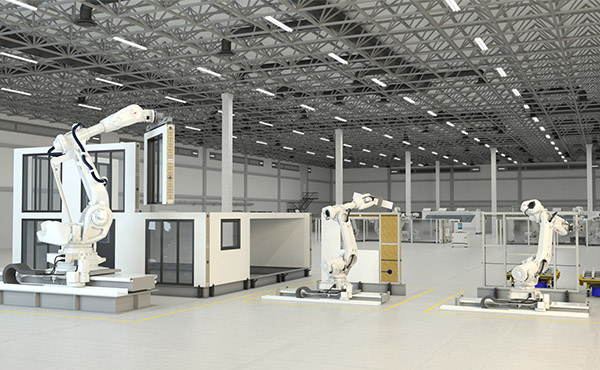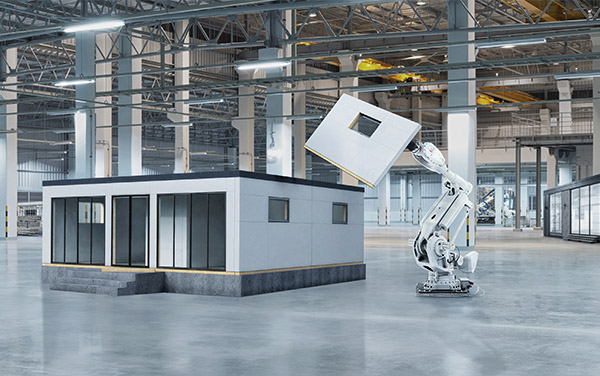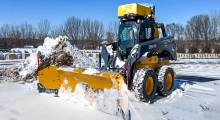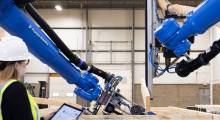Porsche Consulting GmbH and ABB Robotics & Discrete Automation recently announced that they are collaborating on a pilot project to develop new practices in automated manufacturing of modular housing. The companies said the project is intended to meet the need for more affordable and environmentally sustainable buildings, as well as to help the construction industry address widespread labor and skills shortages.
“The construction industry is facing numerous challenges,” noted Eberhard Weiblen, chairman of the executive board at Porsche Consulting.
“Highly automated factories for buildings can deliver higher quality and more affordable housing,” he said in a release. “In combining ABB’s leading robotic solutions and Porsche Consulting’s knowledge in planning and running state-of-the-art factories, we want to help transform this important industry.”
Founded in 1994, Porsche Consulting said it is one of Germany’s leading management consultancies. Its experts support companies around the world as well as the Volkswagen Group with strategic transformation and performance management.
The Porsche consultants work in various industries, including mobility, life sciences, industrial goods, financial services, energy, aerospace, construction, and consumer goods. They also support technology development from locations in Germany, Italy, France, China, Brazil, and the U.S.
Challenges build up for construction
A lack of people to fill construction occupations has contributed to housing shortages in many countries, according to European research. In the U.S., labor shortages are contributing to a housing shortfall of nearly 4 million homes, said Freddie Mac. Deutsche Bank has forecast that Germany will have housing supply shortages in 35 of its cities by 2030.
The traditional construction sector is struggling to meet the demand for new homes, noted Porsche Consulting and ABB Robotics. The partners also said that new construction methods can improve the sustainability and energy efficiency of buildings.
These include reducing the transportation of raw materials to construction sites. Eliminating the corresponding costs of removing unwanted materials accounts for up to 25% of the transportation to a building site, the companies said.
Modular construction can yield efficiencies by reducing materials waste and the number of days lost to adverse weather conditions.
“We understand the importance of sustainable housing and believe the transfer of technology and expertise to the construction sector will deliver the positive impact we have seen in other industries,” Weiblen said.
Automation can also make factories and working environments safer, said ABB. Construction workers account for around 30% of workplace injuries and are four times more likely to be involved in a fatal accident versus other sectors, said the International Labor Organization.

ABB sees room for robotics
Construction lags behind other industries in adoption of automation and robotics. Only 55% of construction companies use robots, compared with 84% in automotive and 79% in manufacturing, said a global survey commissioned by ABB. It polled 1,900 large and small construction businesses in Europe, the U.S., and China.
The survey also found that 81% of construction businesses plan to introduce or increase the use of robotics and automation in the next decade, ABB said. Automation in the sector could rise by 85% by 2030 as demand increases for new and better housing in the face of labor shortages, according to the “Global Construction 2030 Report.”
“We think there is a clear opportunity to transform this sector and the way homes are built by automating the process of manufacturing modular components,” said Marc Segura, president of the ABB Robotics Division. “Greater, more intelligent automation is the answer to widespread labor shortages, and this collaboration will boost productivity, allow greater customization and enable more sustainable and efficient construction practices.”
“We will bring our blueprint to life and demonstrate how robotic modular construction can help support the changes our society is demanding,” he added. “The joint approach will take modular construction to a new level in terms of quality, efficiency, design, and sustainability.”
ABB Robotics claimed that it is “the only company with a comprehensive and integrated portfolio covering robots, autonomous mobile robots [AMRs], and machine automation solutions.” The ABB unit said its hardware and software can help companies of all sizes and sectors—from automotive to electronics and logistics—become more resilient, flexible, and efficient.
With a U.S. office in Auburn Hills, Mich., ABB Robotics said it employs about 11,000 people at over 100 locations in about 53 countries.
Article topics
Email Sign Up

















